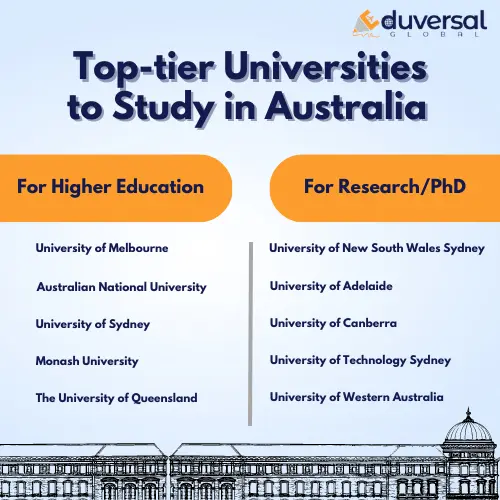Australia is known worldwide for its excellent education system. In 2016-17 over fifteen thousand Indian students
migrated to Australia. But, these numbers surged by 123% (35,400) in 2019-2020.
Australia is a
popular study destination in the English-speaking world. Thus, professionals who have completed their higher
studies abroad are in high demand today. Due to the government's stringent oversight of the educational system,
school standards in Australia are comparatively high.
Seven of its (more than) 40 institutions are
among the greatest in the world for providing the best courses to study in Australia. In fact, the University of
Melbourne and the Australian National University are two of the top forty universities in the world. As a
result, Melbourne and Sydney have emerged as the new hub for the migration of international
students.
If you wish to study in the most popular destinations such as Canada, Australia, the UK,
and the US, let Eduversal help you with their study abroad
consultants to fulfil the requirements for a student visa. It allows you freedom and choice in career
planning. All AQF qualifications aid in your preparation for postsecondary education and the workforce.
Why Study in Australia?
There are a tonne of opportunities for international students in this multicultural nation and several reasons to study in Australia, especially for Indian students. Here are some benefits of choosing Australia as your international study destination along with enrolling in the best courses to study in Australia. Reach out to Eduversal for any issue regarding the abroad studies in Australia.
-
Growing Destination
-
Global Recognition
-
Cost of Living
-
Diversity of Education
Australia is now the third most sought-after location for international students in the English-speaking world. Many foreign students prefer to go for their higher study in Australia due to the rich cultural variety, hospitable locals, and excellent educational opportunities.
Due to the Australian education system's strong international reputation, graduates from Australian universities are in great demand. To preserve the nation's reputation for having excellent standards in education, the government strictly controls this system.
Do not stress more about how to study in Australia. This place has one of the greatest standards of life globally. If you wish to study in the UK or Study in the USA, then do know that Australia has affordable living expenses and higher education. Overseas students may work part-time while enrolled in classes to help pay for living expenses. Additionally, there is the potential for scholarships that aid in reducing the cost of tuition that means students also get several opportunities to study in Australia for free to some extent. Thus, the cost of living to study in Australia for Indian students is comparatively affordable than that of other countries.
International students may easily locate the best university and career sectors to study in Australia thanks to the large range of courses and degrees offered by Australian educational institutions. Students can attend institutions, pursue a career, or take English language classes. Students can transition between educational levels and between institutions with ease, if necessary.
Gain international experience and cultural immersion.
Talk to an education advisorWhat is the study cost in Australia?
Let's examine the price of Australia's education system for international students at various phases, starting with the main component of any expenditures related to studying abroad. The fees for various credentials for overseas students living in Australia are shown in the table below as a general guide
Applicants should note that pricey courses like veterinary and medical are not included in these prices. Continue reading to see what it will cost a scholar to travel from India to Australia and why you should study in Australia:
| Undergraduate Bachelor Degree | AUD 20,000 - 45,000 |
| Postgraduate Master’s Degree | 22,000 - 50,000 |
| Doctoral Degree | AUD 18,000 - 42,000 |
| Vocational Education and Training | AUD 4,000 - 22,000 |
| English language studies | AUD 300 per week |
Students must understand that their choice of universities and course options significantly affects the cost
of their study abroad in Australia. Applicants must understand that these numbers are only estimates and may
alter during the student's real application procedure.
Although tuition fees in Australia make
up most of a student's expenses, other charges closely tied to tuition must also be considered. These are
frequently the extra costs that students must consider while enrolling in college.
Top Five Universities to Study in Australia

Best Courses to Study in Australia
Diploma
- Advanced Diploma in Biomedical Engineering
- Graduate Diploma of Music (Performance)
- Graduate Diploma in Project Management
- Graduate Diploma in Applied Policy
- Graduate Diploma of Business (GDBZ)
- Advanced Diploma in Robotics and Mechatronics Engineering
- Diploma of Leadership and Management
- Advanced Diploma in Mechanical Engineering Technology
- Advanced Diploma in Civil and Structural Engineering
- Advanced Diploma in Industrial Automation Engineering
- Advanced Diploma of Applied Electrical Engineering (Electrical Systems)
- Advanced Diploma of Electrical and Instrumentation (E&I) Engineering for Oil and Gas Facilities
- Graduate Diploma in Business
- Graduate Diploma in Strategic Supply Chain Management
- Graduate Diploma in Property Development
Bachelors
- Bachelor of Science (Civil and Structural Engineering)
- BA (Hons) Bachelor Applied Business Innovation
- BA (Hons) Applied Digital Marketing
- Bachelor of Applied Entrepreneurship
- Bachelor of Music (Performance)
- Bachelor of Design Arts: Interior Design
- Bachelor of Advanced Computing
- Bachelor of Science (Electrical Engineering)
- Bachelor of Science (Industrial Automation Engineering)
- Bachelor of Science (Mechanical Engineering)
- On Campus Bachelor of Science (Civil and Structural Engineering)
- Bachelor of Information Technology
- Bachelor of Commerce (Accounting) DBCA
- Bachelor of Aviation Management
- Bachelor of Applied Business (Management)
Masters
- Master of Project Management
- Master of Business Administration (Global) / Master of Science (Data Analytics)
- Master of Science in Internetworking
- Master of Science Research (MSCR)
- Master of Science in Public Policy and Management 12-Month Track
- Master of Science in Food Science and Technology
- Masters of Marine and Antarctic Science
- MSc in Energy and Resources Management
- Master of Supply Chain Management
- Master of Science (Research) in Mathematical Sciences
- Master of Data Science and Innovation
- Master of Science in Public Policy and Management 21-Month Track
- Master of Science in Information Technology (Business Intelligence and Data Analytics) 21-Month Track
- Master of Science in Public Policy and Management (Digital Transformation & Analytics Concentration) 21-Month Track
- Master of Science in Global Subsea Engineering
Top Government Scholarships

Living Expenses
Want to know how to study in Australia while covering every other expense. The living costs are the sum of money required to cover basic costs, including:
- Housing
- Food
- Transportation
- Utilities
- Healthcare
- Taxes
Given that the abroad studies in Australia differ based on the time of year and your location in
Australia, such costs might be a valuable benchmarking tool. For instance, the cost of living in
a country's capital will be higher than in a regional location. It might be challenging to
determine precise pricing due to the wide regional disparities in the cost of
living.
International students must prove they can afford living expenses of at
least $21,041 per year (or $1,754 monthly), according to the "Department of Home Affairs". The
living expenses for a single individual in Australia are estimated by the collaborative database
“Expatistan" to be $3,697 monthly.
A rising cost of living typically indicates
that necessities have increased in price. Low-income households are particularly affected since
they must spend a bigger portion of their earnings on necessities like food and gas. Low-income
households are disproportionately affected by price increases.
Therefore, the cost
of living is important concerning one's finances since it demonstrates how the overall economy
impacts our unique situation. Students may even have opportunities to study in Australia for
free to some extent by qualifying for specified scholarships programmes.
Enhance your academic and professional growth by studying in Australia.
Get advice from consultantsWhat are the best cities to study in Australia?

Latest Study Visa Guidelines
Documentary Proof Required for an Australia Study Visa
The following standard documents are often required when filing a student visa for moving abroad to study in Australia.
- An "electronic confirmation of enrollment presents proof of enrollment at a college or university".
- An active passport
- Your application fee for a visa
- Your declaration as a "GTE (Genuine Temporary Entrant)"
- Documents relating to education and employment
- Proof of the ability to pay for expenditures, including school, living costs, dependents' living expenses, and roundtrip travel
- Information on the "OSHC health insurance plan
- A statement of intent
- Language proficiency result such as the IELTS test
- Passport size photos
- If you are younger than 18, you must also present other documentation, such as your parents' permission.
The "Simplified Student Visa Framework (SSVF)" procedure has been refined. Thus, the average
processing time is now 4 to 6 weeks. This also depends on the educational institution; the visa
officer can always demand pending documentation if necessary and wanted.
At least 12
weeks before the start of the school's orientation, you must apply for the visa to commence your
plans to Study in Australia.
Education System
The Australian educational system offers primary, intermediate, and postsecondary
education.
The educational system in Australia is consistent nationwide, with only
minor variations across provinces and territories. When you reach "six and sixteen (Year 1 to
Year 9 or 10)," you must attend elementary and secondary school. The 13 years in education are
divided into:
Primary school - Includes kindergarten or prep school and lasts for seven or eight years.
Secondary school - Children aged 7 - 10/ 8 - 10 make up secondary school listings for the next three to four years.
Senior secondary school - Adolescents aged 11 to 12 years are involved in two years of senior secondary education
The "Australian Qualifications Framework (AQF)" integrates university, vocational, and school level qualifications into a streamlined national system that includes ten levels. Students with valid student visas can move easily between levels of schooling and institutions. It gives convenience and possibilities for career planning. All AQF certifications aid your preparation for further learning and professional training.


